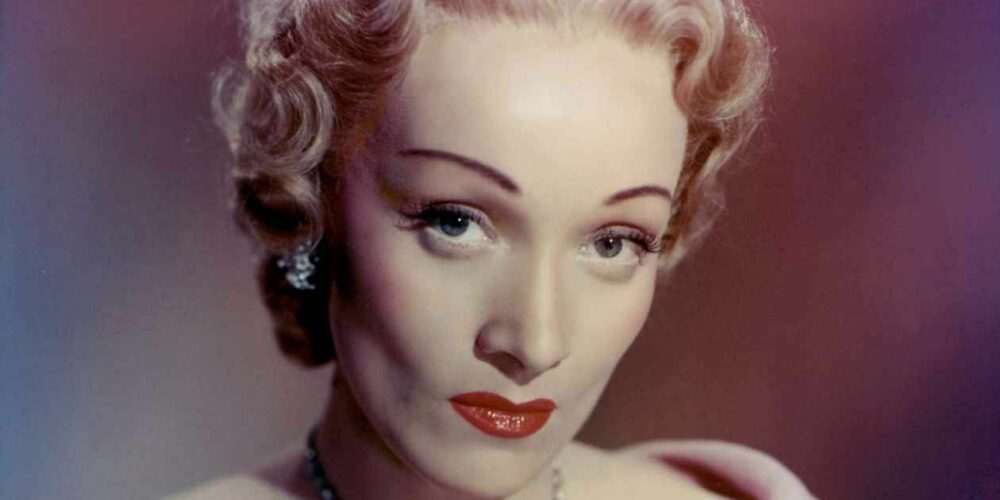Marlene Dietrich, who died thirty years ago on 6 May 1992, must be remembered not only for her importance as a role model for emancipation but also for her outspoken and active stand against her Nazi homeland.
Born in Berlin on 27 December 1901, she became one of the most famous actors of all time. Her breakthrough came with the film The Blue Angel (1929). In 1930 she left Germany for Hollywood. When the Nazis were stripping other artists of their German citizenship, she renounced hers.
Throughout the Second World War, Dietrich actively engaged in the anti-fascist struggle. When she visited Germany after the war she was deemed a traitor in West Germany, with relatively small numbers attending her funeral as late as 1992.
Dietrich’s father, Louis Otto Dietrich, an officer, died when Marlene and her sister were very young. A few years later her mother married Eduard von Losch, who was killed in the First World War. Marlene intended to become a concert violinist, but a wrist injury made this impossible. After that she turned her interest to the stage. She auditioned unsuccessfully at Berlin’s famous Max Reinhardt Drama School. However, all this changed when she was discovered by Josef von Sternberg for his new film project.
The Blue Angel was shot largely in 1929 and had its premiere in 1930. Germany was badly affected by the Wall Street crash, and American loans suddenly dried up. Germany crashed badly, and its severe economic crisis was a fertile ground for the rise of German fascism.
The Blue Angel is a tragedy, with the pompous but by no means malevolent teacher Professor Rath as its tragic hero, whose destruction arouses pity and fear as the audience realise that such a fate could befall them too. As in Shakespeare, the destruction is provoked by the times, and by an inability to cope with the times. Rath represents the older generation, taunted by his students. He is, however, coldly destroyed by the young cabaret dancer Lola. His dignity is destroyed, and this causes his descent into madness.
The ultimate blow comes when the company return to his home town and past colleagues witness the extent of his destruction and, as the company director insists on a final humiliation, madness and death.
The Blue Angel foreshadows aspects of Nazi Germany, a ruthlessness that will not shrink from destroying people and that would rise to power meteorically. In 1933 The Blue Angel was banned in Germany.
Both Sternberg and Dietrich left Germany for Hollywood in 1930. In the 1930s and 40s Dietrich starred in many famous films and was among the first to embody the emancipated woman on screen, with her characteristic trouser suits, hats, and challenge to other “male” domains. She had relationships with both men and women and is celebrated to this day by the LGBTI community.
When Nazi Germany revoked the citizenship of many German artists, Dietrich renounced hers. With Billy Wilder and others she set up a fund to help persecuted people flee Germany. In 1937 she donated her entire income from Knight Without Armour to helping the refugees.
After the attack on Pearl Harbor on 7 December 1941 Dietrich helped sell war bonds. In 1942 the Office of Strategic Services approached her to assist in its propaganda efforts. She recorded American songs in German, but also German songs for use at the front. She was also among those who volunteered in 1944 and 45 and sang to the troops, often under dangerous conditions close to the front line.
After the war, in 1948, she returned to acting, taking on the part—most reluctantly—of a Nazi singer in Billy Wilder’s comedy A Foreign Affair, filmed on location in the ruins of Berlin. In 1962 she narrated the American documentary The Black Fox, which links the rise and fall of Adolf Hitler to Goethe’s story of Reynard the Fox. She also toured the world giving concerts and included in her repertoire new anti-war songs, such as Bob Dylan’s “Blowin’ in the Wind” and Pete Seeger’s “Where Have All the Flowers Gone?” In 1975 she retired from public life.
When Marlene Dietrich died, at the age of ninety, her funeral service in Paris was attended by approximately 1,500 mourners in the church, with thousands more outside. Three medals were displayed at the foot of the coffin recognising Dietrich’s fight against Nazism.
Dietrich had requested that she be buried in her birthplace, Berlin, and her body was flown there on 16 May 1992. However, there was little public acknowledgement of this event, and comparatively few people attended the burial. On her last visit to (West) Berlin in 1960 she had been threatened and harassed, and the police had feared disruptions of the funeral by neo-Nazi groups. A wave of hate mail and insults such as “traitor” to a (West) Berlin newspaper and the Senate had caused the Senate to cancel the planned transfer in a Bundeswehr (German armed forces) jet and a memorial service in the Deutsches Theater in her honour. Eight months later she was awarded an honorary grave, which was desecrated a year later.
On her hundredth birthday, 27 December 2001, the city finally apologised for the hostility she had faced there after the war. Not a word about the controversies over naming a street after her, nothing about the cancellation of the official commemoration. On 16 May 2002, Marlene Dietrich was posthumously made an honorary citizen of Berlin.






